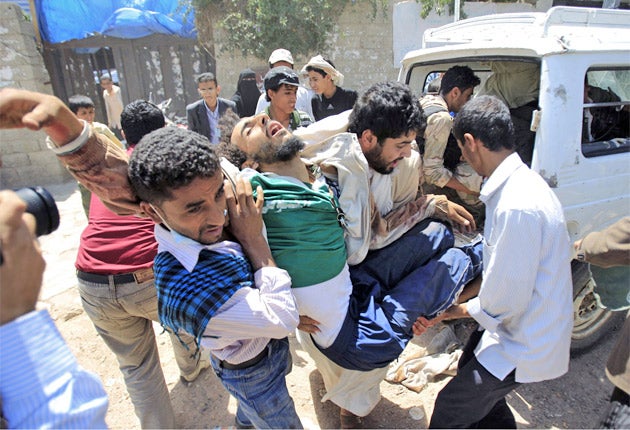Street fighting spreads in Sanaa as protesters seek to unseat Saleh

Your support helps us to tell the story
From reproductive rights to climate change to Big Tech, The Independent is on the ground when the story is developing. Whether it's investigating the financials of Elon Musk's pro-Trump PAC or producing our latest documentary, 'The A Word', which shines a light on the American women fighting for reproductive rights, we know how important it is to parse out the facts from the messaging.
At such a critical moment in US history, we need reporters on the ground. Your donation allows us to keep sending journalists to speak to both sides of the story.
The Independent is trusted by Americans across the entire political spectrum. And unlike many other quality news outlets, we choose not to lock Americans out of our reporting and analysis with paywalls. We believe quality journalism should be available to everyone, paid for by those who can afford it.
Your support makes all the difference.Street battles between opponents and supporters of the Yemeni president raged in the capital Sanaa yesterday, as fighting spread amid fears the escalating civil conflict could turn the country into another Somalia.
The last three days of fighting are the worst in the eight-month-long confrontation between President Ali Abdullah Saleh and those trying to end his 33-year-rule of Yemen, which was the poorest Arab state even before the present crisis. An estimated 66 people have been killed as government units fire at protesters with heavy calibre machine guns and mortars and pro-opposition soldiers fire back.
The government, whose authority has always been weak, is losing control of outlying parts of the country, while power is divided in the capital. The UN envoy to Yemen, Jamal bin Omar, warned that, if no compromise was reached between those vying for power, Yemen "would face collapse and the 'Somalisation' of the country".
There are already signs of this happening. The number of Yemenis suffering from malnutrition has risen to nine million people, or one-third of the population, according to the UN Office for the Co-ordination of Humanitarian Affairs. It says the price of basic foodstuffs, such as flour, sugar and milk has risen by 40-60 per cent, and petrol is 900 per cent more expensive than at the start of the year.
Violence is escalating and hospitals have been unable to cope with the flow of casualties. At dawn yesterday President Saleh's forces fired bombs killing seven protesters in Change Square, where demonstrators have camped since the beginning of the uprising. Families fled the city as shooting spread to districts previously peaceful.
The country is split at every level. President Saleh has been in Saudi Arabia since he was seriously wounded by a bomb in June, but his sons, particularly Ahmed, have held their ground in the capital. They are opposed by the sons of Abdullah al-Ahmar, the former head of the Hashid tribal confederation, who command powerful militia forces. Other players include General Ali Mohsen, the head of Yemen's First Armoured Division, who defected in March and ordered his men to protect the protesters. The demonstrators want to lever President Saleh out of power.
Saudi Arabia, the Gulf Co-operation Council and the US are meant to be mediating, but Washington has not demanded that President Saleh step down. Instead the US embassy has called for equal restraint by protesters, who are being shot at, and government soldiers and plain-clothes men who are doing the shooting. The US has been focussing on managing the crisis so it can continue to use drones and Yemeni Special Forces to pursue al-Qa'ida in the Arabian Peninsula.
Join our commenting forum
Join thought-provoking conversations, follow other Independent readers and see their replies
Comments